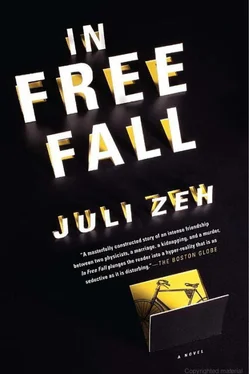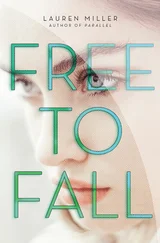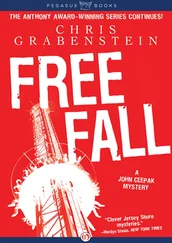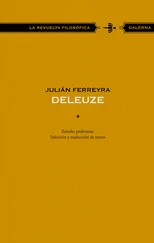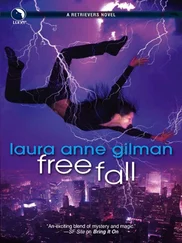“The problem,” he says, amazed at his own calm, “is that you don’t believe me.”
Maike finishes her glass of water, but does not know what to do with her hands after that.
“Sebastian,” she says quietly, “have I ever given you cause to be jealous? Over Ralph?”
Sebastian’s knee crashes against the table as he stands up abruptly, and curry slops off the plates onto the tablecloth. He stands with his back to the room, facing the glass door to the balcony, searching for the faint reflection of his face. He looks himself in the eye in order to know what to do next. Silently, he practices the sentence that he must say, a sentence that includes the words “truth,” “trust,” “I,” and “Dabbelink.” It is probably the only chance to save himself and Maike. A new feeling keeps him from speaking. It is the conviction that it is too late, and he finds it strangely uplifting.
“Please, Sebastian! I’m asking you, please!”
When he turns around, Maike’s eyes implore him. Sebastian feels like sliding down against the wall and dropping his head between his knees. That would probably have been a good idea, certainly better than the uncertain journey on which he has embarked. At the kitchen doorway, he looks at Maike again properly, the way she is sitting there, her frame slighter than usual, thin and hunched. He smells the fear that makes her hard and strange. He sees her eyelids fluttering and her agitated hands clawing the tablecloth. Sebastian does not know how anyone with such small hands can survive in a world like this, or bring up a child, or love a man like him. He shares Maike’s conviction that she and Liam are simply victims. He bears his guilt alone and out into the hall.
“I’m taking your car,” he calls. “Mine’s been impounded. See you later.”
He has never felt the weakness of mankind so clearly as during these few steps out of the apartment. The affectation of walking upright, the power of speech and free will, is suddenly exposed as a laughable hoax. Here are the car keys, the stair landing, the cast-iron streetlamps, the trees and the buildings, and here is Maike’s little car on a side street. The world is a signage system he just has to follow.
A liberating sense of clarity divides Sebastian’s thoughts into squares on a grid. The voice in his head tells him that he has just made an unforgivable and probably irrevocable mistake. In the continuous chain of horrible events that his life has become, walking out of the kitchen is the crowning glory. It wouldn’t be difficult to turn on his heel, climb back up the stairs, and steer the story a different way. But the observer in Sebastian recognizes that unforgivable mistakes are not the result of inattention, error, or not knowing better.
What distinguishes them is that they permit no alternative, even in full knowledge of the circumstances.
The central locking clicks. Sebastian feels the vibration of the engine in his arms and legs. He is a perfectly normal person driving a small car through the neighborhood in which he lives, shops, and works. He crosses the main road leading out of town, which is busy throughout the day regardless of what is happening in the world at large, and enters the enormous network of junctions, intersections, and connections that span the planet like the synapses of a giant brain. It’s amazing how little it takes to make a ruinous decision, Sebastian thinks. Soon after, he is on the autobahn.
IT CANNOT BE SAID THAT RITA SKURA and Detective Schilf have absolutely nothing in common. Like Rita, Schilf hated birds as a child. He had his reasons. They gobbled up the butterflies with whom he conducted epistemological debates beneath the walnut tree. They had immobile faces that showed neither pain nor joy. They stared at him fixedly, concealing a knowledge, which, in his opinion, they did not deserve. He thought it was unfair that they alone surveyed the world from above. If he had known then that it is always the observer who creates reality, he would have despised the birds even more for being the creators of a failed world.
Birds were also the source of nerve-racking noise. They didn’t give a damn about other living things who wanted to think, play, or sleep. Often the little Schilf went to his parents in bed in the middle of the night. I can’t sleep, he would cry. The birds are screaming in the garden, and trampling on the roof!
His parents laughed about that for years after he had left home, but Schilf didn’t find it funny. All those nights he had been unable to sleep, they had assured him that not a single bird could be heard for miles around. From then on, he had believed them to be on the side of the enemy.
Schilf has not thought about this for a long time; it must have turned up in his dreams. He awakens with the feeling that the sharp edge of a beak is boring into the soft inner sanctum of his skull. If only he could be left in peace to think, he would be able to ask himself what the little detective would have said about the bird’s egg in the big detective’s head.
Confused, he lies in a gloomy room, and it takes some time for him to realize where he is. The shadows around him are the furniture in the police apartment, and the shrill sounds that are tearing at his nerves are not coming from the throats of birds but from a ringing telephone. Schilf presses on the buttons of his mobile to no avail until he hits on the idea of getting up from the sofa to answer the landline.
“Is that you, Rita?”
A sunny laugh comes down the line.
“Sorry, there’s no Rita here. It’s me.”
There are not many me ’s in the detective’s life. Most of the people he gets to know well disappear behind the bars of a penal institution sooner or later. So he doesn’t have to think for long.
“How did you get the number of the police apartment?”
“You gave it to me.”
Julia is right—for every “me” there is a “you.” Schilf’s new girlfriend has not been wrong about a single thing since he met her, and she seems to find that perfectly natural. The detective can see her now, sitting in the armchair next to the coffee table, hooking her finger into a hole in her sock.
“Did I wake you up?” she asks.
Schilf has not had the chance to switch on the light yet. Impenetrable darkness lurks behind the open doors of the kitchen and the bathroom, as if night were being produced for the entire country there.
“No,” he says. “What do you want?”
The laugh comes down the line again.
“To ask how you are.”
This is not an unusual request, but it surprises Schilf. Julia is ten years older than Rita Skura, but to him she stands just as clearly on the other side of the divide between young and old as Rita does. She is part of a new informal generation, a generation that treats everyone like a good friend. With someone uncomplicated like her, Schilf, with his respect for the infinite complexity of things, can relax and feel like a relic from a bygone age. A person like Julia, who can barge her way into a stranger’s life with the words “Don’t have a job, don’t have any family, and I don’t like the benefit reforms,” is perfectly capable of ringing just to ask how he is.
“Good,” Schilf says, which is true and false at the same time, and therefore needs elaboration. “I’ve found the murderer. Now I’ve got to protect him from the police.”
“I thought you worked for the police.”
“That doesn’t make things any easier.”
“Have you fallen in love with the murderer?”
Now it is Schilf’s turn to laugh. He wishes he could see life through Julia’s eyes, just for once. It must be like a building with a very straightforward design. Not your everyday detached house—that would be too boring; but perhaps a circus tent with an entrance, an exit, benches to sit on, and a roof. The detective can practically smell the sweet scent of the sawdust.
Читать дальше
